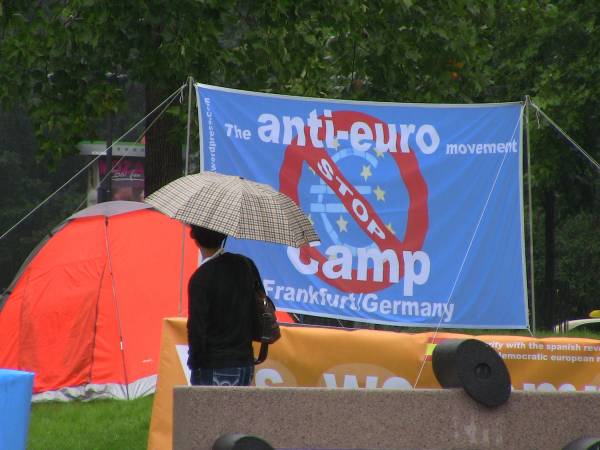RWE/CREA 22 Oktober: To Euro or Not to Euro
Maandag 22 oktober 20-22.00. Real World Economics and Transnational Institute organiseren een informatieve avond en debat over de Euro-crisis. Met Marica Frangakis (Nicos Poulantzas Institute), Geert Reuten (UvA, Senator van de SP) and Dimitris Pavlopoulos (VU Amsterdam). Gespreksleiding Rodrigo Fernandez (RWE).
(English translation at bottom)

Zo’n 15 jaar geleden, in februari 1997, waarschuwden zeventig Nederlandse economen in een manifest voor de gevaarlijke structurele zwaktes in het neoliberale ontwerp van de Economische en Monetaire Unie (zie http://www.sdnl.nl/emu-1.htm). Het manifest bekritiseerde met name het willekeurige karakter van de gekozen fiscale regels, die regelmatige bezuinigingsmaatregelen in heel Europa vereisten, wat zou leiden tot de geleidelijke ontmanteling van de welvaartsstaat, stagnatie van lonen, een scherpe stijging van werkloosheid en groeiende ongelijkheid. Politici, journalisten en academici waren eensgezind in het negeren van deze waarschuwing – bevangen als ze waren door het geloof dat de grote ongelijkheden tussen de deelnemende economieën op een wonderbaarlijke manier zouden verdwijnen op het moment dat de gemeenschappelijke munt ingesteld zou worden. Vragen over het intens ondemocratische karakter van de Europese Centrale Bank en diens mandaat om inflatie te allen prijze laag te houden, werden zelden gesteld.
Ondertussen zijn de voorspellingen van het manifest allemaal ontpopt tot een onwelkome waarheid. De harde bezuinigingen en privatiseringen die vergezeld gaan met de terugkerende ‘reddingspakketten’ van de EU en het IMF en de interventies van de ECB lijken de crisis alleen maar te verergeren. Landen van de periferie als Griekenland, Portugal en Spanje zijn een diepe recessie ingegaan die wat sociale kosten betreft alleen maar te vergelijken is met de Grote Depressie van de jaren 1930 tot aan de oorlogstijd.
Dit Real World Economics-programma gaat in op de belangrijke vraag of en hoe deze perifere landen in de Eurozone kunnen overleven. De kwestie van het verlaten van de euro heeft sociale bewegingen in Zuid-Europa de afgelopen twee jaar geplaagd. Tegelijkertijd lijken politieke elites stelselmatig afwijzend te reageren op de mogelijkheid van een ‘Grexit’, ‘Spexit’, of Italexit’. Gastsprekers zijn Marica Frangakis (Nicos Poulantzas Institute), Geert Reuten (UvA, Senator van de SP) and Dimitris Pavlopoulos (VU Amsterdam). Gespreksleiding Rodrigo Fernandez (RWE).
http://www.crea.uva.nl/agenda.php?agenda_id=1209
Meer informatie over Real World Economics programma’s: https://www.globalinfo.nl/tag/real-world-economics
Voertaal Engels
————————
RWE/CREA 22 October: To Euro or Not to Euro
Monday October 22 20-22.00
Real World Economics and Transnational Institute debate:
About 15 years ago, in February 1997, a manifest by 70 Dutch economists warned about the untenable structural flaws in the neoliberal design of the Economic and Monetary Union (see http://www.sdnl.nl/emu-1.htm). The manifest particularly criticized the arbitrary nature of the chosen fiscal rules, requiring repeated rounds of austerity measures across Europe, which would result in a gradual dismantling of welfare states, wage stagnation, a sharp rise
in unemployment and growing inequality. Politicians, journalists and academics alike ignored these warnings – enthralled by the belief that the large disparities between member economies would somehow miraculously dissolve once the common currency area had been established. Questions about the profoundly undemocratic nature of the European Central Bank and its mandate to keep inflation low at all costs were seldom raised.
Meanwhile, the manifest’s forecasts have become an inconvenient truth. The harsh austerity and privatization policies that accompany the recurring ‘rescue’ packages of the EU and the IMF and the interventions of the ECB seem to only aggravate the crisis. Countries of the periphery such as Greece, Portugal and Spain have entered an ever deeper recession which in terms of its socioeconomic costs only compares to the Great Depression in the 1930s and to periods of war.
This Real World Economics session addresses the important question of whether and how these peripheral countries will survive in the Eurozone. The issue of leaving the euro has troubled social movements of southern European countries over the past two years. At the same time, political elites categorically seem to refute the possibility of a ‘Grexit’, ‘Spexit’, or ‘Italexit’. Invited guest speakers are Marica Frangakis (Nicos Poulantzas Institute), Geert Reuten (UvA, Senator of the SP) and Dimitris Pavlopoulos (VU Amsterdam). Moderated by Rodrigo Fernandez (RWE).
http://www.crea.uva.nl/agenda.php?agenda_id=1209
Mor information on Real World Economics programs:
https://www.globalinfo.nl/tag/real-world-economics
English spoken